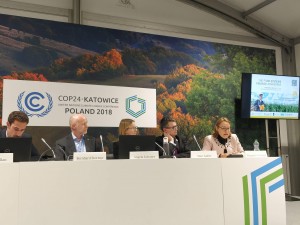Hey guys, this is Saadiq. I had a packed day at COP24 today running around to meetings about very interesting stuff. I had meetings about Gender and Climate, the role of business in helping countries reach their NDC (Nationally Determined Contributions) targets, ways to mitigate food waste, financing food projects, and a meeting about how to ensure equity in national actions to achieve NDCs. I’m going to briefly talk about two of the meetings, financing food projects and how to ensure equity in national actions to achieve NDCs because I found these really interesting.
The equity in NDCs talk focused on the research of academics who conducted case studies regarding the development of NDCs. It looked at how NDCs are developed by states and exposes what/who they choose privilege in these formulations. I had never thought of NDCs as being biased or problematic because these are supposed to be the ambitious goals of countries to ensure we stay under 1.5 C. What I learned is that certain countries could choose mitigation strategies that did not benefit their whole population. For example, dams could be built in one region while electrifying a whole other region would be ignored. There are no specific guidelines about ensuring equity from the UNFCCC (smh). I also learned that for some developing countries, the same consulting firms help formulate LDCs (Least Developed Countries) NDCs. Therefore, these firms, from the global north, could have great influence on what LDCs NDCs look like.
The second talk about food financing was hosted by the World Bank and focused on how to get financing to small farmers to support smart agriculture. This is supposed to be a bottom-up approach to greening the food system that takes into account and allegedly quantifies carbon offsets, gender equity and health impacts of projects before giving them money. (I would be interested to see how they quantify gender impacts.) They, however, failed to talk about efforts and policies to green big-agri which was suspicious even while saying that by 2050 agriculture will account for 70% of GHGs (Greenhouse gases). Yes, shocking right. On the somewhat bright side, they discussed how big banks are now taking climate change seriously by considering the environmental impacts of projects that want funding. They talked at length about case studies but again only related to small farmers who do not contribute as much to emissions as big-agri.
That’s all for today but stay tuned to see more rants. Pa!

Really interesting, Saadiq – I didn’t think of NDCs being written by consulting firms.
I assume that that figure for the percentage of GHGs from agriculture must assume not only growth in ag but also a substantial decrease of GHGs from energy generation? That’s the only way I can make sense of it. So in some ways it could be good to get to the point of having agriculture being our biggest worry (since it means we will have dealt with some bigger problems) but it does highlight how many pieces of the puzzle there are.